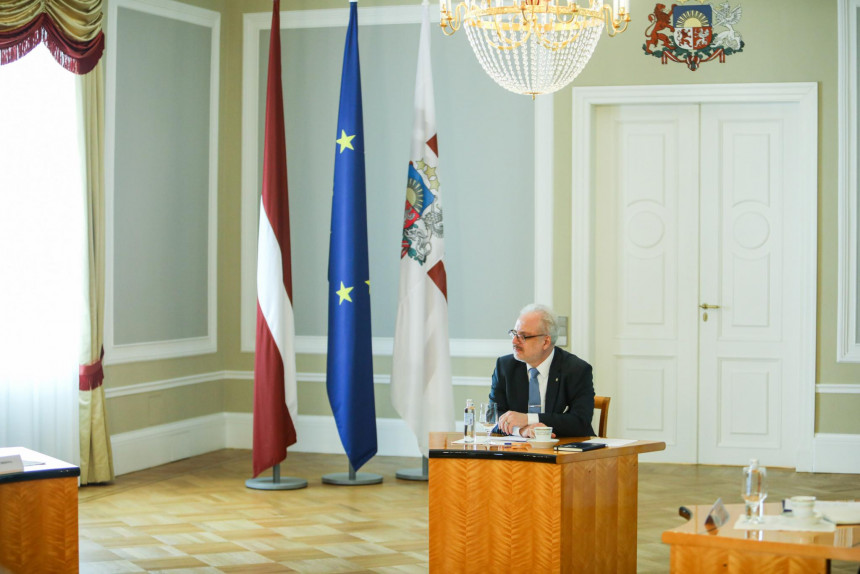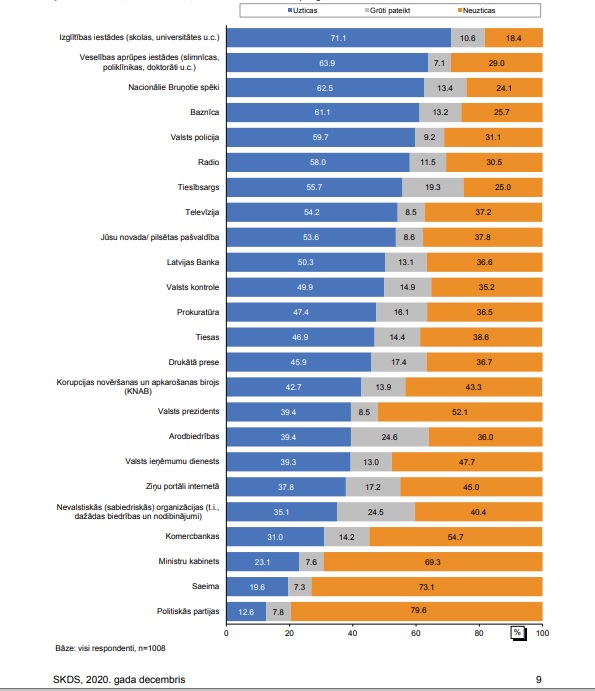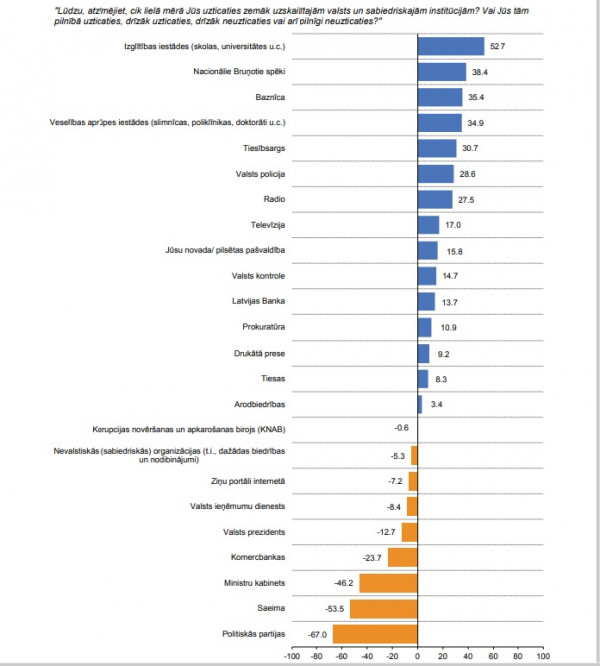In Latvia, people trust news on the Internet and the church more than political parties

70 to 80 percent of the population do not trust the Cabinet of Ministers, the Saeima, and political parties, which means that most reforms, new laws, amendments to existing laws, decisions, and statements are viewed with suspicion by the people. At present, the population trusts the army, the police, the media, and the church more than politicians, on whose decisions life and future prospects in Latvia depend.
The highest trust rating in Latvia is for educational institutions (schools, universities). Currently, 71 percent of respondents trust them. No other institution in Latvia has such a high trust rating, according to a study by SKDS, which was commissioned by Neatkarīgā.
Shrinking trust in politicians

In April 1997, when SKDS conducted a similar study, 38 percent of the population trusted the Saeima, 39 percent trusted the Cabinet of Ministers, which was headed by Andris Šķēle at that time. It is not much, but not as dramatically low as in the coming years. In April 2000, only 21% trusted the Saeima, and only 18% trusted the Cabinet of Ministers, again headed by Andris Šķēle. 10 years later - in April 2010 - when the state had experienced the collapse of Parex Bank and the brutal tightening of its belts, the Saeima was trusted by only 7%, but the Cabinet headed by Valdis Dombrovskis - 13%. The Saeima, the Cabinet of Ministers, and politicians since then have never had such a low confidence rating. However, Latvia also hasn't experienced another crisis in the last ten years as deep as the one of 2008. At least until last year, when Latvia, like the rest of the world, had to start fighting Covid-19 and its consequences.
Last December, when SKDS asked people if they trusted political parties, only 13 percent of the population answered in the affirmative. The Saeima (20% positive answers) and the government of Krišjānis Kariņš (23% positive answers) had earned slightly more trust. As the confidence rating of political parties among Latvian citizens was even lower (11 percent), it must be concluded that non-citizens trust in Latvian politicians a little more than citizens.
The lowest rating of the institution of the President in 10 years
Currently, 39 percent of the population trusts the President as an institution. The current President Egils Levits is supported by 33.8 percent of the population (E. Levits' name was unfamiliar to 2.4% of respondents, but 15% did not have an opinion). E. Levits' assessment has significant differences between Latvian and Russian speakers, as his work is positively assessed by 42 percent of Latvian speakers, but only 21 percent of Russian speakers.
The rating of the current institution of the President is the lowest since 2010.
As the poll was conducted last December, the opinion of the population was probably influenced by the peripetia surrounding the president's salary. And the fact that in the end E. Levits refused the salary supplement did not save the situation. At a time when the President was Valdis Zatlers, Andris Bērziņš, or Raimonds Vējonis, the assessment of the presidential institution was higher. Between 41 and 65 percent of the population trusted it. As the study does not contain data on the assessment of the population for the President until 2010, it is not possible to determine during which President the rating of public trust in the President has been the highest - and during which - the lowest.
The army and police have risen in the eyes of the people

The year 1997 in Latvia was shrouded in bloody events and tragedies. In January, armed robbers attacked Latvijas Pasts' car, killing two postal workers. In June, nine children lost their lives at a firefighter festival in Talsi organized by the Ministry of the Interior, after a lift basket broke at 19-meters height and fell on a car (this event has become known as the Talsi tragedy). In September, during the Iecava massacre, Jurijs Čubarovs shot seven people who were picking potatoes and then committed suicide. Consequently, the low trust of the population in the State Police in 1997 is not surprising. At that time, 33 percent of respondents trusted the State Police, but 64 percent answered in the negative. At present, the opposite is true: 60 percent of the population trust the State Police, but less than a third do not trust it - 31 percent.
The National Armed Forces have managed to obtain a similar trust. In 1997, only 28 percent trusted this structure, now it is 63 percent. Minister of Defense Artis Pabriks is also currently one of the highest-rated ministers in the eyes of the population in the current government. His work so far is positively assessed by 40 percent of the surveyed Latvians, 32 percent of Latvian citizens, and 15 percent of Russian-speaking Latvians.